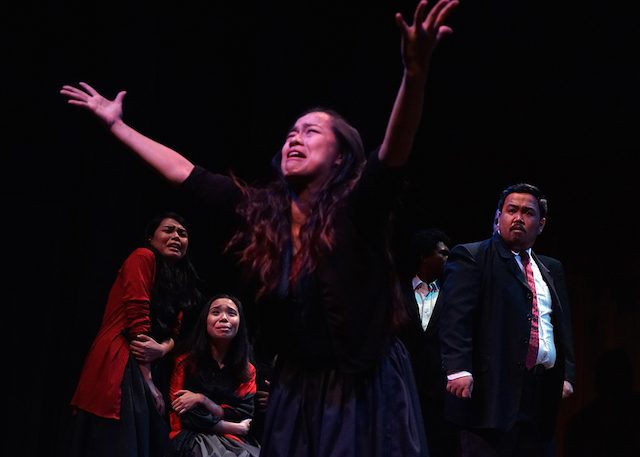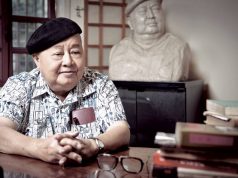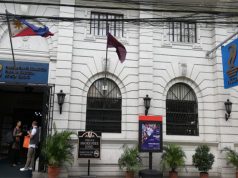Tanghalang Pilipino’s latest production is essentially a Filipino translation of Arthur Miller’s “The Crucible.” Set in 1692 Salem, Massachusetts, it tells the story of how a young and bewitching Abigail Williams manipulates authorities for her personal gain. Aided by her impressionable minions, she convinces officials that members of their small humdrum community are engaging in witchcraft, which is punishable by law; thereby pushing them into incarceration and, eventually, death.
The idea of 17th century Americans garbed in period attire but speaking in Filipino is a bit jarring at first. As the play progresses, however, these details become irrelevant, overshadowed by the play’s many virtues.
Antonette Go fires up the stage as Abigail Williams. She has mastered the art of feigning godliness and innocence, using it as a disguise to conceal her wicked, evil plot. When her tactics are uncovered, she maintains her saintly demeanor, remorseless of the havoc she has caused. You will hate Abigail Williams, but you will be blown away by Antonette’s powerful and gripping performance.
There are other abominable characters aside from Abigail: the snooty and self-righteous Reverend Parris, played by Marco Viana; the spineless Reverend Hale played by Joshua Martin Tayco; and the imposing and self-preserving Deputy Governor Danforth played by Jonathan Tadioan.
Soon, it turns out that Abigail is holding a deep grudge against Elizabeth and John Proctor, and that her finely crafted scheme is part of a revenge plot against the accused couple.
JV Ibesate’s John Proctor is calculated and firm, but not without weakness. He is flawed, with misgivings towards his wife. And at his darkest hour, he blazes with intensity and flows with sensitivity, a formidable force against Abigail’s web of deceit. On the other hand, his wife Elizabeth (Doray Dayao) is the perfect portrait of a pitifully dull and neglected wife.
As Mary Warren, Lhorvie Nuevo’s naivete and child-like demaeanor defies that of a grown woman. We see that there is more to her when she transitions from a helpless girl to a woman of principle.
Every person that Abigail adds to the list is put into jail without due process; then forced into admission of a crime he or she did not commit. If the accused refuses to plead guilty to the charges, execution becomes the next course of action. People are persecuted based only on Abigail’s allegations, and the rest live in fear knowing that they might be the next target.
The Proctors face the moral dilemma of pleading guilty to the allegations to save their lives; or to allow skeletons out of the closet and fight for the truth. It’s a question of allowing oneself to be eaten by the system, or to continue the battle for what is right and just; a scenario that has become all too familiar in the Philippines today.
The clear-cut narrative presents glaring realities that cannot be ignored. “Ang Pag-Uusig” mirrors present-day truths despite being set in 1600s Puritan America. It’s a chilling realization that socio-political ills from centuries ago—a time when witchcraft was deemed criminally punishable— still exist in the world we now live in. They continue to plague our own society, even at the cost of people’s lives.
One watches “Ang Pag-Uusig” with the intention of being entertained, but comes out of the theater fearful of a probable future, by a story based on a forgotten past.
The last remaining shows of “Ang Pag-Uusig” will run at the Tanghalang Huseng Batute (CCP Studio Theater) of the Cultural Center of the Philippines until Sunday, October 22. Tickets are P1000 (VIP), P800 (Bleachers), available at Ticketworld Online and Outlets with hotline +632 8919999, the CCP Box Office +632 8323704, and the Tanghalang Pilipino office +632 8321125 loc 1620 and +63915 6072275.
“Ang Pag-uusig” is rated PG-13.










